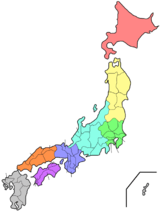Fukuoka Prefecture
Fukuoka Prefecture (Japanese: 福岡県, Hepburn: Fukuoka-ken) is a prefecture of Japan located on the island of Kyūshū.[1] Fukuoka Prefecture has a population of 5,109,323 (1 June 2019) and has a geographic area of 4,986 km² (1,925 sq mi).[2] Fukuoka Prefecture borders Saga Prefecture to the southwest, Kumamoto Prefecture to the south, and Ōita Prefecture to the southeast.
Fukuoka Prefecture 福岡県 | |
|---|---|
| Japanese transcription(s) | |
| • Japanese | 福岡県 |
| • Rōmaji | Fukuoka-ken |
 Flag  Symbol | |
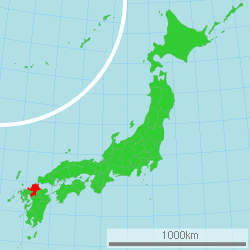 | |
| Coordinates: 33°36′N 130°35′E | |
| Country | Japan |
| Region | Kyushu |
| Island | Kyushu |
| Capital | Fukuoka |
| Subdivisions | Districts: 12, Municipalities: 60 |
| Government | |
| • Governor | Hiroshi Ogawa (since April 2011) |
| Area | |
| • Total | 4,986.52 km2 (1,925.31 sq mi) |
| Area rank | 29th |
| Population (June 1, 2019) | |
| • Total | 5,109,323 |
| • Rank | 9th |
| • Density | 1,000/km2 (2,700/sq mi) |
| ISO 3166 code | JP-40 |
| Website | www.pref.fukuoka.lg.jp/somu/ multilingual/english/top.html |
| Symbols | |
| Bird | Japanese bush warbler (Cettia diphone) |
| Flower | Ume blossom (Prunus mume) |
| Tree | Azalea (Rhododendron tsutsusi) |
Fukuoka is the capital and largest city of Fukuoka Prefecture, and the largest city on Kyūshū, with other major cities including Kitakyushu, Kurume, and Ōmuta.[3] Fukuoka Prefecture is located at the northernmost point of Kyūshū on the Kanmon Straits, connecting the Tsushima Strait and Seto Inland Sea across from Yamaguchi Prefecture on the island of Honshu, and extends south towards the Ariake Sea.
History
Fukuoka Prefecture includes the former provinces of Chikugo, Chikuzen, and Buzen.[4]
Shrines and temples
Kōra taisha, Sumiyoshi-jinja, and Hakozaki-gū are the chief Shinto shrines (ichinomiya) in the prefecture.[5]
Geography

Fukuoka Prefecture faces the sea on three sides, bordering Saga, Ōita, and Kumamoto prefectures and facing Yamaguchi Prefecture across the Kanmon Straits.
| Year | Pop. | ±% p.a. |
|---|---|---|
| 1890 | 1,236,015 | — |
| 1903 | 1,571,158 | +1.86% |
| 1913 | 1,926,417 | +2.06% |
| 1920 | 2,188,249 | +1.84% |
| 1925 | 2,301,668 | +1.02% |
| 1930 | 2,527,119 | +1.89% |
| 1935 | 2,755,804 | +1.75% |
| 1940 | 3,094,132 | +2.34% |
| 1945 | 2,746,855 | −2.35% |
| 1950 | 3,530,169 | +5.15% |
| 1955 | 3,859,764 | +1.80% |
| 1960 | 4,006,679 | +0.75% |
| 1965 | 3,964,611 | −0.21% |
| 1970 | 4,027,416 | +0.31% |
| 1975 | 4,292,963 | +1.29% |
| 1980 | 4,553,461 | +1.19% |
| 1985 | 4,719,259 | +0.72% |
| 1990 | 4,811,050 | +0.39% |
| 1995 | 4,933,393 | +0.50% |
| 2000 | 5,015,699 | +0.33% |
| 2005 | 5,049,908 | +0.14% |
| 2010 | 5,071,968 | +0.09% |
| 2015 | 5,101,556 | +0.12% |
| source:[6] | ||
As of 1 April 2012, 18% of the land area of the prefecture was designated as natural parks: Setonaikai National Park, Genkai, Kitakyūshū, and Yaba-Hita-Hikosan quasi-national parks, and Chikugogawa, Chikuhō, Dazaifu, Sefuri Raizan, and Yabegawa Prefectural Natural Parks.[7]
Fukuoka includes the two largest cities on Kyūshū, Fukuoka and Kitakyushu, and much of Kyūshū's industry. It also includes a number of small islands near the north coast of Kyūshū.
Cities
Twenty-nine cities are in Fukuoka Prefecture:
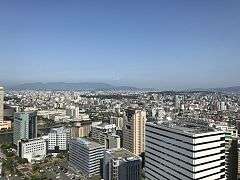 Fukuoka City
Fukuoka City- Tobata, Kitakyushu
- Kurume
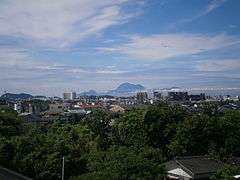 Omuta
Omuta
Towns and villages
These are the towns and villages in each district:
Mergers
Economy
Fukuoka prefecture's main cities form one of Japan's main industrial centers, accounting for nearly 40% of the economy of Kyūshū. Major industries include automobiles, semiconductors, and steel. Fukuoka prefecture is where tire manufacturer Bridgestone[8] and consumer electronics chain Best Denki were founded.
Universities
One of Japan's top 5 universities, Kyushu University, is located in Fukuoka.
| Institution | Location |
| Fukuoka University | Fukuoka |
| Kurume University | Kurume |
| Kyushu Institute of Technology | Kitakyūshū and Iizuka |
| Kyushu University | Fukuoka and Kasuga |
| Seinan Gakuin University | Fukuoka |
| Kyushu Institute of Information Sciences | Dazaifu |
| Kyushu Sangyo University | Fukuoka |
| Fukuoka Women's University | Fukuoka |
| Fukuoka University of Education | Munakata |
Demographics
According to October 2018 estimates, the population in Fukuoka Prefecture reached 5,111,494 inhabitants, making the prefecture the 9th most populated of Japan's 47 prefectures. It is one of the few prefectures with a steadily increasing population.
Culture
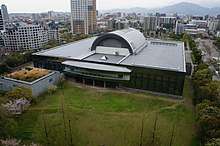
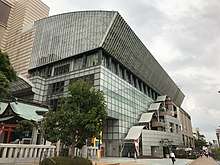
- Fukuoka Art Museum – In Ohori Park; contains a wide selection of contemporary and other art from around the world
- Fukuoka Asian Art Museum – contains art from Asia
- Fukuoka City Museum – displays a broad range of items from the region's history, including a spectacular gold seal
- Genko Historical Museum (元寇史料館, Museum of the Mongol Invasion) in Higashi Koen (East Park) displays Japanese and Mongolian arms and armor from the 13th century as well as paintings on historical subjects; open on weekends
- Hakata Machiya Folk Museum – Dedicated to displaying the traditional ways of life, speech, and culture of the Fukuoka region
- Fukuoka Castle – a castle in Chūō-ku, Fukuoka
- Hakata Gion Yamakasa – Japanese festival celebrated 1–15 July
- Ōhori Park – a registered Place of Scenic Beauty
- Kyushu National Museum – The collections cover the history of Kyūshū from prehistory to the Meiji era with particular emphasis on the rich history of cultural exchange between Kyūshū and neighboring China and Korea
- HKT48 Theater – where the idol group HKT48 performs every day
- LinQ – the Kyushu idol group meaning "Love in Kyushu", local theater where the LinQ performs weekly on Saturday and Sunday in Tenjin Best Hall
- Bairin-ji – Rinzai temple and garden in Kurume
Major events and festivals
- Hakata Dontaku Harbour Festival, Tenjin, Fukuoka on May 3 and 4
- Hakata Gion Yamagasa, Kushida Shrine, Fukuoka in July
- Kokura Gion Yamagasa, Kitakyushu in July
- Tobata Gion Yamagasa, Kitakyushu in July
- Kurosaki Gion Yamagasa, Kitakyushu in July
- Kitahara Hakushu Festival, Yanagawa on November 1 to 3
Sports
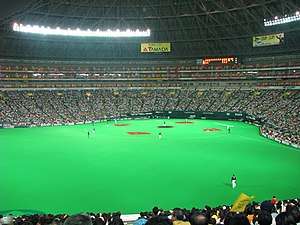
The sports teams listed below are based in Fukuoka.
- Football (soccer)
- Avispa Fukuoka (Fukuoka City)
- Giravanz Kitakyushu (Kitakyūshū City)
- Fukuoka J. Anclas
- Baseball
- Fukuoka SoftBank Hawks (Fukuoka City)
- Basketball
- Rizing Zephyr Fukuoka (Fukuoka City)
- Rugby
- Coca-Cola Red Sparks (Fukuoka City)
- Fukuoka Sanix Blues (Munakata)
- Kyuden Voltex
- Sanix World Rugby Youth Tournament
The prefecture has two significant annual athletics events: the Fukuoka International Cross Country and the Fukuoka International Open Marathon Championship. The marathon has been held in Fukuoka since 1959 and has seen world records broken.[9]
Crime and safety
Fukuoka Prefecture has the most designated yakuza groups among all of the prefectures, at five: the Kudo-kai, the Taishu-kai, the Fukuhaku-kai, the Dojin-kai and the Kyushu Seido-kai.[10] Between 2004 and 2009, and in early 2011,[11] Fukuoka Prefecture led the nation in gun-related incidents.[12] These incidents were mostly related to the local yakuza syndicates, specifically the Kudo-kai, the Dojin-kai, and the Kyushu Seido-kai.[11]
Fukuoka Prefecture had the highest frequency of youth crime among the prefectures of Japan from 2003 to 2007.[13]
According to statistics from the national police, the crime rate in Fukuoka was the eighth-highest in 2017, lower than in Osaka, Tokyo, Hyogo, Aichi, Saitama, Chiba and Ibaraki.[14]
Tourism
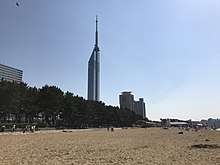
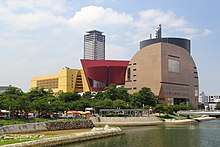
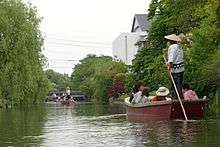
The most popular place for tourism is Fukuoka City, especially during the Dontaku festival, which attracts millions of visitors from across Japan during Golden Week.[15] Fukuoka is the main shopping, dining, transportation and entertainment hub in Kyushu.
Dazaifu is popular for its many temples and historical sites, as well as the Kyushu National Museum.
Yanagawa is sometimes called "the Venice of Japan" for its boat tours on the abundant, calm rivers that wind through the city.[16]
Kitakyushu features one of the famous night views of Japan from atop Mt. Sarakura, accessible via cablecar. The Mojiko area features waterfront dining, a market, and several preserved historical buildings. The Kanmon Kaikyo Tunnel which connects Kyushu (Moji ward, Kitakyushu) and Honshu (Shimonoseki) is free to walk through. The city center in Kokurakita ward contains the Riverwalk and Itsutsuya shopping complexes, Kokura castle, and the Uomachi Gintengai shopping arcade, the oldest shopping arcade in Japan.[17]
Transportation
Rail
- West Japan Railway Company(=JR Nishinihon)
- Sanyō Shinkansen
- Hakata Minami Line
- JR Kyushu
- Kyūshū Shinkansen, Kagoshima Main Line, Chikuhō Main Line, Nippō Main Line, Kyudai Main Line
- Chikuhi Line, Gotōji Line, Kashii Line, Hitahikosan Line, Sasaguri Line
- Nishi-Nippon Railroad
- Tenjin Ōmuta Line, Dazaifu Line, Nishitetsu Amagi Line, Kaizuka Line
- Amagi Railway
- Heisei Chikuhō Railway
- Ita Line, Itota Line, Tagawa Line
- Fukuoka City Subway
- Kūkō Line, Hakozaki Line, Nanakuma Line
- Kitakyushu Monorail
Air
- Fukuoka Airport
- New Kitakyushu airport
Sister regions
Notes
- Nussbaum, Louis-Frédéric. (2005). "Fukuoka-ken" in Japan Encyclopedia, p. 218, p. 218, at Google Books.
- "都道府県 人口ランキング". Retrieved November 27, 2018.
- Nussbaum, "Fukuoka" in p. 218, p. 218, at Google Books.
- Nussbaum, "Provinces and prefectures" in p. 780, p. 780, at Google Books.
- "Nationwide List of Ichinomiya," p. 3 Archived May 17, 2013, at the Wayback Machine; retrieved 2012-10-26.
- Statistics Bureau of Japan
- "General overview of area figures for Natural Parks by prefecture" (PDF). Ministry of the Environment. 1 April 2012. Retrieved 8 December 2013.
- "Bridgestone Holds the Opening Ceremony for its Kitakyushu Plant". Bridgestone. August 4, 2009.
- Nakamura, Ken. Marathon - A history of the Fukuoka International Marathon Championships by K. Ken Nakamura - Part 1 1947-1966. IAAF. Retrieved on 2010-02-28.
- "Retrospection and Outlook of Crime Measure", p.15 Archived 2011-09-27 at the Wayback Machine, Masahiro Tamura, 2009, National Police Agency (in Japanese)
- "Gunfire, The worst in the nation, None has been solved" Archived 2012-09-05 at Archive.today, 23 June 2011, Nishinippon Shimbun (in Japanese)
- "Fukuoka yakuza groups tackle police pressure in all-out war", 4 May 2010, The Tokyo Reporter, from Friday May 14, p.22-23 (in Japanese)
- 非行防げ、捜査員奮闘…少年犯罪全国ワースト1の福岡 Archived 2009-02-12 at the Wayback Machine, Yomiuri Shimbun (in Japanese)
- "「犯罪の県民性」大阪が全国ワースト、殺人1位、すり2位". Diamond Online. Retrieved November 27, 2018.
- "Hakata Dontaku Festival". Japan National Tourism Organization. Retrieved November 27, 2018.
- "水の国 柳川". 筑後七国よかとこ巡り旅. Retrieved November 27, 2018.
- "Uomachi-gintengai Street". Kitakyushu City Travel Guide. Retrieved November 27, 2018.
References
- Nussbaum, Louis-Frédéric and Käthe Roth. 2005. Japan encyclopedia. Cambridge: Harvard University Press. ISBN 978-0-674-01753-5; OCLC 58053128
External links
| Wikimedia Commons has media related to Fukuoka Prefecture. |
| Wikivoyage has a travel guide for Fukuoka Prefecture. |
